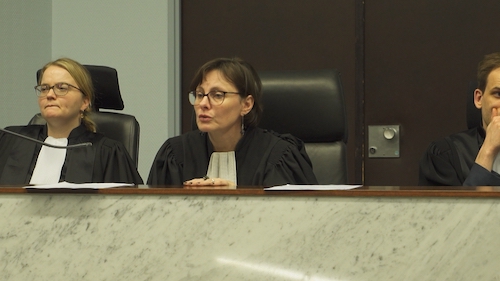
- 60'
- Author : Michelle Fines
- 03-10-2020
- Master : 2973
-
Share!
IMMEDIATE TRIAL: COMMITTAL ORDER AT THE HEARING | TF1 | Reportages
A close look behind the scenes of everyday justice. At the Nancy court, 517 cases are tried every year as immediate trials. In order to reduce delays in judgements, prosecutors are increasingly sending somewhat complex cases such as drugs where the accused risk up to 10 years jail to these courts.
In France, during the 2000s, there were 30,000 immediate trials: today, there are 50,000. Accused persons are tried on release from custody. To understand how this fast-track justice works we accompanied the president of an immediate trials court, then a victim and, finally, an accused person. Anne Marie Gobin has been a magistrate for 25 years. The days when she presides over immediate trails often turn into Marathons. She picks up the case files in the middle of the morning and, on average, has 30 minutes to become acquainted with them before the court session begins at 2pm. Anne Marie Gobin knows how much one short hour of a hearing can turn the course of a life upside down. “Actually, the duration of a hearing is a magic moment. For the people who come before us, whether victims or perpetrators, it is the only time when they can speak to a magistrate about their case.” Petty crimes, driving without a licence, assaults and drugs are the common subjects of immediate trials. However, the most delicate cases to deal with are those of marital violence. “They are probably the most complex cases because we are right in the midst of the suffering of the aggressor and the aggressed, partly because it relates to affect, love and passion. Even if it is a love that is badly expressed, there is, nevertheless, something powerful behind it.” On this particular day, a couple is appearing before the court. A few months ago, the husband was convicted of conjugal violence; the court banned him from going near his wife. “It’s not uncommon,”explains Anne Marie Gobin, “and in such cases you can’t help wondering if you’re going to see her again?”. 1 in 4 of the cases appearing for immediate trial is for assault. We followed one of these stories: from custody in the Nancy police station to sentencing. Yoann, having only just reached the age of majority, is charged with abuse and assault of police officers. He is accused of biting¾and drawing blood from¾the officer who was trying to put him in a cell. Yoann, who has already been arrested dozens of times for similar acts when he was a minor, will face justice for majors¾much more severe¾for the first time. The prosecutor demands a committal order at the hearing. “We can see clearly that he off the rails… this is a major problem with minors. Because they know they risk very little by going into detention, they get into bad habits… Sometimes the first sentence by the court makes them think. I think that this lad needs to realise the risks he is running.”. The final case is one for drugs. Before the court, are two young 30-year-old women, who don’t look seem to be the usual accused at immediate trials. One is a book-keeper, the other a student. And yet they were arrested by customs officers in possession of 46 kilos of cannabis weed. They risk 10 years in prison. The lawyer for one of the accused protests: according to her this case should have been referred to an examining magistrate. “There are commissioners here, but they are not being sought. This is not good justice: quick justice is justice where we don’t go far enough and we don’t take sufficient care, where we don’t respect the freedoms and the rights of each individual.”. An accused is 8 times more likely to go to jail when judged at immediate trial than before an examining magistrate.
